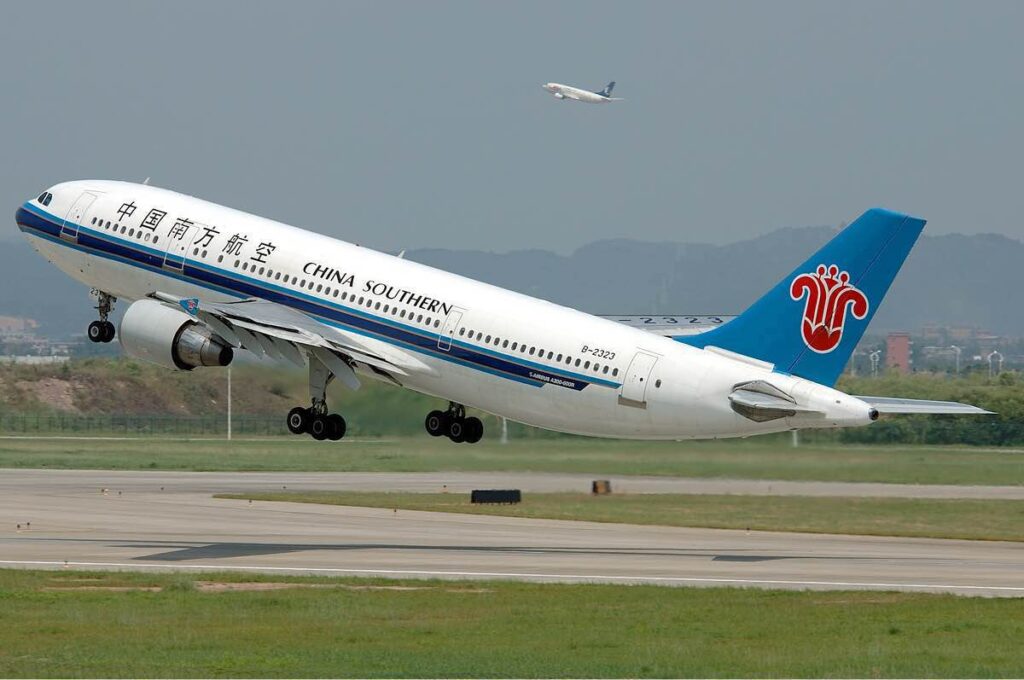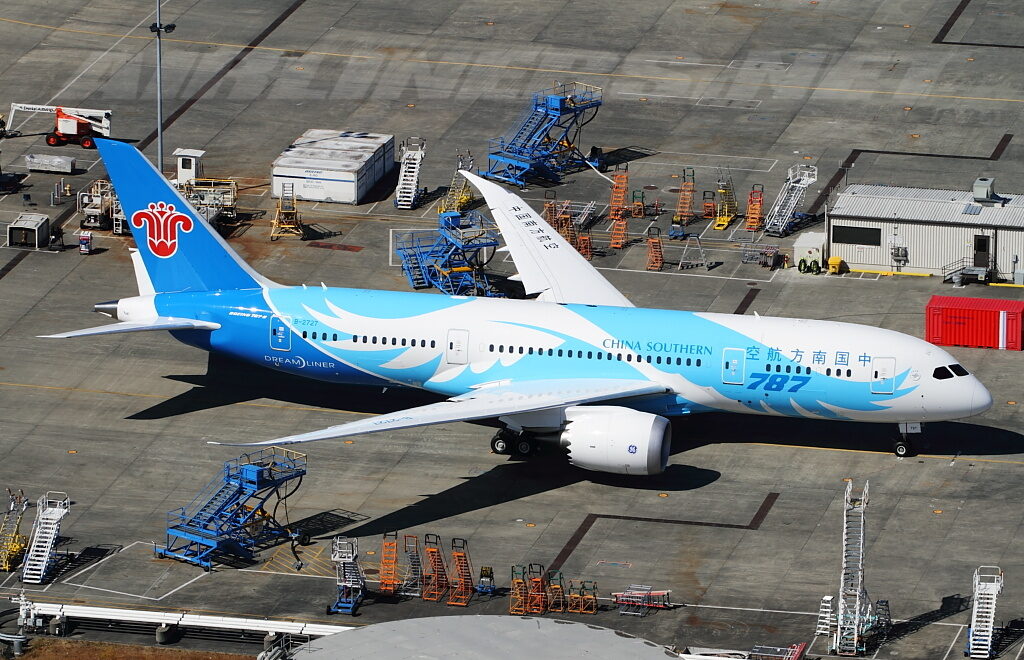Why is China Southern Airlines Selling Its Entire Boeing 787-8 Fleet?
In a strategic move to optimize its fleet amidst a slow recovery of long-haul international routes following the COVID-19 pandemic, China Southern Airlines has announced plans to sell its entire fleet of 10 Boeing 787-8 aircraft. This decision made public on November 19, 2024, includes the sale of two GE Aerospace GEnx-1B engines and marks a significant shift in the airline’s operational focus.

A Decade of Service: From Delivery to Sale
China Southern Airlines received its first Boeing 787-8, registered as B-2725, in May 2013. Over the past decade, these aircraft have been integral to the airline’s long-haul operations, connecting passengers to destinations across the globe. However, as the aircraft approach their 12-year mark, they are due for heavy maintenance checks, which can be both time-consuming and costly. By selling these aircraft, the airline can avoid these maintenance expenses and potentially reinvest in newer, more efficient models.
Request for Proposals
On November 19, 2024, the airline issued a request for proposals to interested buyers, with a strict mandate that all aircraft and engines be sold as a complete package. Partial-fleet purchase proposals were explicitly rejected. Interested buyers were required to submit preliminary expressions of interest by November 25, 2024, with detailed technical specifications and aircraft condition reports to be distributed to qualified buyers by November 30, 2024.
Streamlining Operations
China Southern Airlines is focusing on streamlining its operations and standardizing its fleet by concentrating on its larger Boeing 787-9 variant. Currently, the airline operates 18 Boeing 787-9 aircraft, which are newer and more fuel-efficient compared to the 787-8s. This shift not only reduces operational complexity but also aligns with the airline’s broader strategy to optimize its fleet for better performance and cost-efficiency.
Implications for the Market
The sale of the Boeing 787-8 fleet presents a unique opportunity for other airlines or leasing companies. These relatively young widebody aircraft are still in good condition and can be acquired at a competitive price. Additionally, the sale could stimulate the market for used aircraft components, given the increasing demand for 787 parts.
Strategic Decision Amidst Market Challenges
The decision to sell the Boeing 787-8 fleet comes at a time when the aviation industry is navigating a challenging recovery phase. The COVID-19 pandemic has significantly impacted long-haul international travel, and airlines worldwide are reassessing their fleet compositions to adapt to the evolving market dynamics. For China Southern Airlines, focusing on the 787-9 variant allows for more operational flexibility and cost savings, positioning the airline for future growth.
Future Prospects
As China Southern Airlines looks to the future, this strategic fleet optimization is expected to enhance its competitive edge. By investing in newer, more efficient aircraft and reducing maintenance costs, the airline can better navigate the uncertainties of the post-pandemic aviation landscape. This move also aligns with the airline’s commitment to sustainability, as newer aircraft typically offer better fuel efficiency and lower emissions.

Additional Insights from Industry Experts
Industry experts have weighed in on the implications of this sale. According to Lee Carey, VP of asset management at EirTrade, the dismantling of older aircraft like the Boeing 787-8s is becoming more common as airlines seek to avoid the high costs of maintenance checks. EirTrade, a Dublin-based aviation trading company, has experience in dismantling young widebody aircraft, including Airbus A380s from Singapore Airlines and Air France.
Historical Context and Market Trends
China Southern Airlines has a long history of adapting its fleet to meet changing market demands. The introduction of the Boeing 787-8 into its fleet in 2013 was a significant milestone, representing the airline’s commitment to modernizing its fleet with more fuel-efficient and passenger-friendly aircraft. However, the slow recovery of long-haul international routes has prompted the airline to reassess its fleet strategy.
Market Dynamics and Competitive Landscape
The aviation industry is currently experiencing a slow recovery from the impacts of the COVID-19 pandemic. Long-haul international travel, which the pandemic severely affected, is gradually picking up, but airlines are still carefully evaluating their fleet compositions. China Southern Airlines’ decision to sell its Boeing 787-8 fleet is a proactive measure to ensure financial stability and competitiveness in the market. By focusing on the more efficient Boeing 787-9 variant, the airline can better manage its operational costs and improve its overall performance.
Impact on Fleet Composition and Maintenance Costs
Maintaining a diverse fleet can be challenging and costly, especially as aircraft age and require more frequent maintenance checks. The Boeing 787-8 aircraft, approaching their 12-year mark, are due for heavy maintenance checks, which can be both time-consuming and expensive. By selling these aircraft, China Southern Airlines can avoid these significant costs and potentially reinvest in newer, more efficient models. This move also simplifies the airline’s fleet composition, making it easier to manage and maintain.
Opportunities for Buyers and Leasing Companies
The sale of China Southern Airlines’ Boeing 787-8 fleet presents a unique opportunity for other airlines or leasing companies to acquire relatively young widebody aircraft that are still in good condition. Given the increasing demand for 787 parts, the sale could also stimulate the market for used aircraft components. This move highlights a trend among airlines to optimize their fleets for better efficiency and cost-effectiveness.
Strategic Fleet Optimization and Future Growth
China Southern Airlines’ decision to sell its Boeing 787-8 fleet is part of a broader strategy to optimize its fleet and focus on more efficient aircraft models. This move aligns with the airline’s commitment to sustainability, as newer aircraft typically offer better fuel efficiency and lower emissions. By investing in newer, more efficient aircraft and reducing maintenance costs, the airline can better navigate the uncertainties of the post-pandemic aviation landscape and position itself for future growth.
Conclusion
The sale of its Boeing 787-8 fleet is a significant step for China Southern Airlines in its efforts to streamline operations and focus on more efficient aircraft models. This decision reflects the airline’s proactive approach to adapting to market changes and optimizing its fleet for long-term success. As the aviation industry continues to recover from the impacts of the COVID-19 pandemic, decisions like these are crucial for maintaining financial stability and competitiveness in the market.



